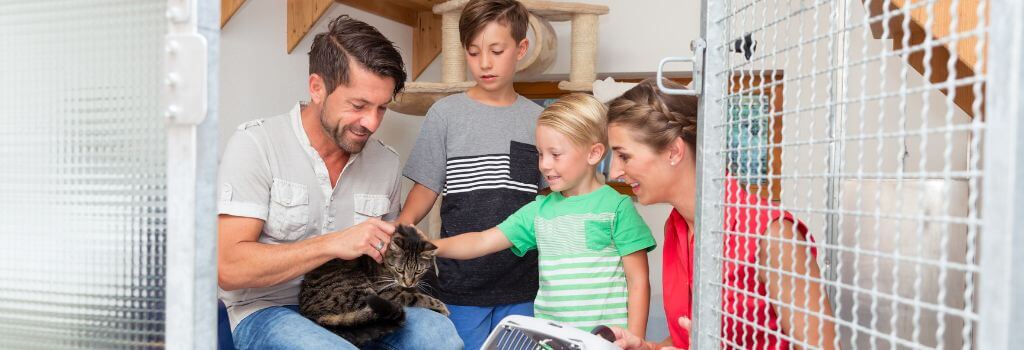Thousands of families across the United States experience the joy and companionship that pets bring into their lives. This number continues to grow each year as more and more Americans open their hearts and homes to new pets.
If you're among those looking to add a new four-legged friend to your family, adopting a dog or cat from a shelter is a great option to not only find the pet of your dreams but also save lives and help alleviate the overpopulation crisis plaguing so many shelters and rescue organizations.
Support for animal shelters and helping displaced animals find a forever home has grown increasingly over the years. In fact, Americans celebrate National Adopt A Shelter Pet Day to raise awareness about the millions of companion animals living in shelters while awaiting their forever homes. Above and beyond this holiday, we all know that any day is a great day to bring about awareness about the option to add a new pet to your family or spend some time volunteering at a local animal shelter, too. Over the years, you've probably heard a lot of myths about shelter pets. As veterinarians, we're here to separate fact from fiction. In this blog post, we'll debunk a few of the most common myths about shelter pets. We've seen countless success stories of shelter pets finding loving homes and thriving, and we hope to encourage you to consider adopting when you are ready to become a pet owner or bring home an additional four-legged family member.

Myth #1: Shelter Pets Are Damaged Goods
Many folks assume that animals who end up in shelters must have some sort of damage. After all, why would anyone surrender a perfectly good pet to a shelter? In reality, people give up animals for many reasons. Sometimes, they have allergies or personal issues. They might be going through a divorce or moving somewhere that doesn't allow pets. Not having the money to afford a pet's care is, unfortunately, another common reason for pet parents to surrender perfectly healthy and happy pets.
In many situations, dogs, cats, and other pets end up in shelters at no fault of their own. Most are perfectly adoptable and far from "damaged." They may need some extra training, but with love and patience, most of the animals in shelters are worthy pets.
Myth #2: Shelter Animals Are Often Sick
While it's true that shelters take in pets with health issues, they address those problems before putting an animal up for adoption. Shelters go to great lengths to care for pets and provide appropriate treatment for illnesses, ensuring that the pets are in good health before adoption.
Depending on the shelter, pets often get the following done during their time there (if needed):
If an animal has a chronic disease, like diabetes, the shelter will make sure they are stable and provide information about their health before adoption. No shelter knowingly adopts out sick animals — especially without notifying potential adopters.
Myth #3: Shelter Dogs Are Aggressive
It's a common misconception that most dogs end up in shelters for displaying aggressive behavior. Sure, there are some aggressive dogs in shelters. But they certainly do not make up the majority of a shelter's population. Most shelters will do a behavioral assessment for every dog that’s admitted. Dogs are typically tested for food and leash aggression, handling habits (touching ears, feet, muzzles, etc), and territorial/ other pet aggression. If a dog does have any behavioral problems, shelter employees will make potential adopters aware of such issues before adoption.
Myth #4: You Can't Find Purebred Animals in Shelters
Surprisingly, this is entirely untrue. According to numerous studies, around 25% of the dogs and cats in shelters are purebreds. There are countless breed-specific rescue groups and shelters spread throughout the nation. Finding a specific breed to adopt might take more time than buying a pet from a breeder, but it's well worth the effort when you get the breed you want and get to make a difference in an animal's life.
Myth #5: Shelters Only Have Dogs and Cats
It's true that some shelters only have dogs and cats. However, there are many others where you can adopt just about any type of pet imaginable, including birds, rabbits, guinea pigs, and more. There are even large animal and livestock rescues with pigs, goats, horses, and more if you're looking to add this type of animal to your family.
Myth #6: Buying From a Breeder Is Safer Because of Bloodlines
People often go to breeders to get purebred animals and avoid getting a pet with aggression issues. While bloodlines and medical histories are useful tools for evaluating pets, they have very little value in predicting behavior or potential health problems. According to the ASPCA, purebred animals are often predisposed to certain medical issues. Genetic disorders are also common among purebreds.
Myth #7: If You Adopt an Older Pet, They Won't Bond
There is no correlation between an animal's age and their ability to bond with their owners and other household pets. Adopting a senior pet offers numerous benefits, and there's no need to worry about their ability to bond. Senior cats and dogs show just as much love and affection as their younger counterparts. In this case, age is just a number.
Myth #8: Shelter Pets Are Dirty
It's common for pets entering shelters to look a bit dirty or scraggly. After a bath, haircut (if needed), medication, and vaccinations, though, they look and feel much better. All shelters check pets for external parasites and provide flea treatments as needed. Most shelters offer at least basic grooming services regularly to maintain pets' coats, nails, etc. Sometimes, professional groomers even donate their services to help pets look their best so they're more likely to find forever homes.
Additionally, shelter cats aren't any more likely to be "dirty" in terms of not using a litter box than a cat you buy from a breeder. An underlying health or behavioral problem usually causes litter box avoidance.

Consider Adding a Shelter Pet to Your Family
No matter what time of year, think about the message of Adopt A Shelter Pet Day, and consider adding a new furry friend to your family. Shelter pets have a lot of love to offer, and you’ll feel great knowing that you helped an animal in need. If you decide to open up your heart and home to a shelter pet, we are here for you with all of the knowledge and resources you may need to pick the right pet for your family and ensure they have a long and happy life.
Finding a reputable shelter or rescue organization to adopt your new furry friend is easier than you might think! Start by checking out local shelters online, where you can read reviews and see how other pet lovers rate them. For a more personal touch, visit the shelters in person to get a feel for the place, chat with staff about what animals are available, and learn about their adoption process. Make sure they provide top-notch medical care and behavioral assessments to ensure you're bringing home a happy, healthy pet.
If you have questions and you'd like to reach out to us, you can call us directly at (310) 606-2407, or you can email us at [email protected]. Don't forget to follow us on social media Facebook, Instagram.
